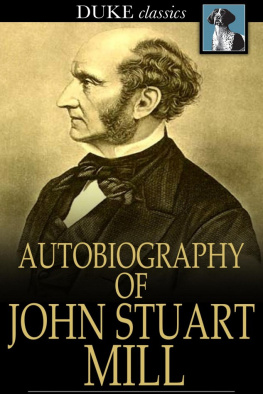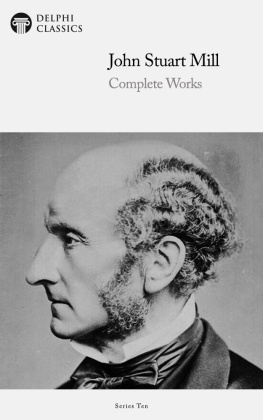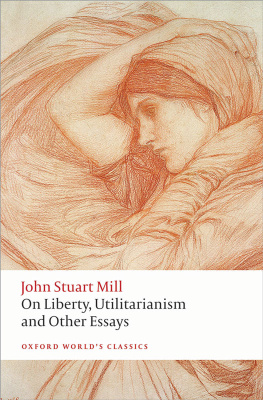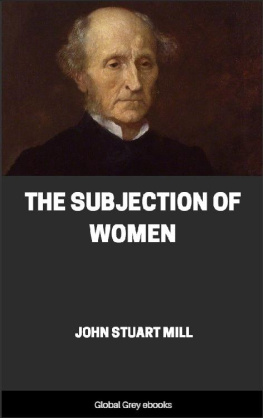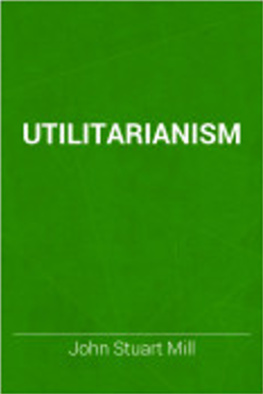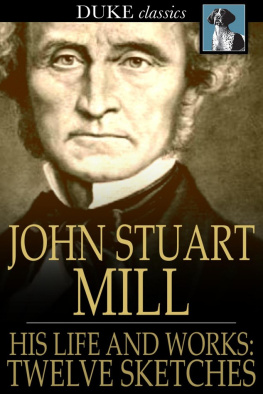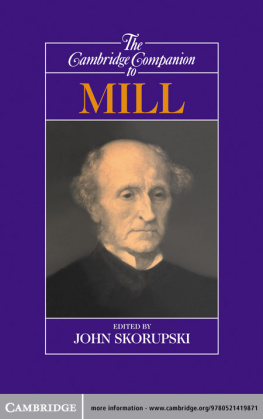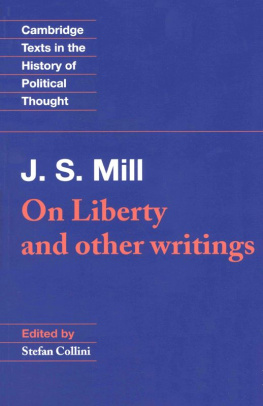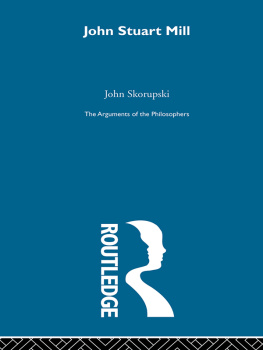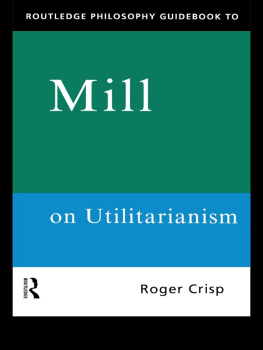AUTOBIOGRAPHY OF JOHN STUART MILL
* * *
JOHN STUART MILL
*
Autobiography of John Stuart Mill
First published in 1873
ISBN 978-1-62011-228-1
Duke Classics
2012 Duke Classics and its licensors. All rights reserved.
While every effort has been used to ensure the accuracy and reliability of the information contained in this edition, Duke Classics does not assume liability or responsibility for any errors or omissions in this book. Duke Classics does not accept responsibility for loss suffered as a result of reliance upon the accuracy or currency of information contained in this book.
Contents
*
Chapter I
*
CHILDHOOD AND EARLY EDUCATION.
It seems proper that I should prefix to the following biographical sketchsome mention of the reasons which have made me think it desirable that Ishould leave behind me such a memorial of so uneventful a life as mine.I do not for a moment imagine that any part of what I have to relate canbe interesting to the public as a narrative or as being connected withmyself. But I have thought that in an age in which education and itsimprovement are the subject of more, if not of profounder, study than atany former period of English history, it may be useful that there shouldbe some record of an education which was unusual and remarkable, andwhich, whatever else it may have done, has proved how much more than iscommonly supposed may be taught, and well taught, in those early yearswhich, in the common modes of what is called instruction, are littlebetter than wasted. It has also seemed to me that in an age of transitionin opinions, there may be somewhat both of interest and of benefit innoting the successive phases of any mind which was always pressing forward,equally ready to learn and to unlearn either from its own thoughts or fromthose of others. But a motive which weighs more with me than either ofthese, is a desire to make acknowledgment of the debts which myintellectual and moral development owes to other persons; some of them ofrecognised eminence, others less known than they deserve to be, and theone to whom most of all is due, one whom the world had no opportunity ofknowing. The reader whom these things do not interest, has only himself toblame if he reads farther, and I do not desire any other indulgence fromhim than that of bearing in mind that for him these pages were not written.
I was born in London, on the 20th of May, 1806, and was the eldest sonof James Mill, the author of the History of British India. My father,the son of a petty tradesman and (I believe) small farmer, at NorthwaterBridge, in the county of Angus, was, when a boy, recommended by hisabilities to the notice of Sir John Stuart, of Fettercairn, one of theBarons of the Exchequer in Scotland, and was, in consequence, sent tothe University of Edinburgh, at the expense of a fund established byLady Jane Stuart (the wife of Sir John Stuart) and some other ladiesfor educating young men for the Scottish Church. He there went throughthe usual course of study, and was licensed as a Preacher, but neverfollowed the profession; having satisfied himself that he could notbelieve the doctrines of that or any other Church. For a few years hewas a private tutor in various families in Scotland, among others thatof the Marquis of Tweeddale, but ended by taking up his residence inLondon, and devoting himself to authorship. Nor had he any other meansof support until 1819, when he obtained an appointment in the India House.
In this period of my father's life there are two things which it isimpossible not to be struck with: one of them unfortunately a verycommon circumstance, the other a most uncommon one. The first is, thatin his position, with no resource but the precarious one of writing inperiodicals, he married and had a large family; conduct than whichnothing could be more opposed, both as a matter of good sense and ofduty, to the opinions which, at least at a later period of life, hestrenuously upheld. The other circumstance, is the extraordinaryenergy which was required to lead the life he led, with thedisadvantages under which he laboured from the first, and with thosewhich he brought upon himself by his marriage. It would have been nosmall thing, had he done no more than to support himself and hisfamily during so many years by writing, without ever being in debt,or in any pecuniary difficulty; holding, as he did, opinions, both inpolitics and in religion, which were more odious to all persons ofinfluence, and to the common run of prosperous Englishmen, in thatgeneration than either before or since; and being not only a man whomnothing would have induced to write against his convictions, but onewho invariably threw into everything he wrote, as much of hisconvictions as he thought the circumstances would in any way permit:being, it must also be said, one who never did anything negligently;never undertook any task, literary or other, on which he did notconscientiously bestow all the labour necessary for performing itadequately. But he, with these burdens on him, planned, commenced, andcompleted, the History of India; and this in the course of about tenyears, a shorter time than has been occupied (even by writers who hadno other employment) in the production of almost any other historicalwork of equal bulk, and of anything approaching to the same amount ofreading and research. And to this is to be added, that during thewhole period, a considerable part of almost every day was employed inthe instruction of his children: in the case of one of whom, myself,he exerted an amount of labour, care, and perseverance rarely, ifever, employed for a similar purpose, in endeavouring to give,according to his own conception, the highest order of intellectualeducation.
A man who, in his own practice, so vigorously acted up to theprinciple of losing no time, was likely to adhere to the same rulein the instruction of his pupil. I have no remembrance of the timewhen I began to learn Greek; I have been told that it was when I wasthree years old. My earliest recollection on the subject, is that ofcommitting to memory what my father termed vocables, being lists ofcommon Greek words, with their signification in English, which hewrote out for me on cards. Of grammar, until some years later, Ilearnt no more than the inflections of the nouns and verbs, but, aftera course of vocables, proceeded at once to translation; and I faintlyremember going through Aesop's Fables, the first Greek book whichI read. The Anabasis, which I remember better, was the second. Ilearnt no Latin until my eighth year. At that time I had read, undermy father's tuition, a number of Greek prose authors, among whom Iremember the whole of Herodotus, and of Xenophon's Cyropaedia andMemorials of Socrates; some of the lives of the philosophers byDiogenes Laertius; part of Lucian, and Isocrates ad Demonicum and AdNicoclem. I also read, in 1813, the first six dialogues (in the commonarrangement) of Plato, from the Euthyphron to the Theoctetus inclusive:which last dialogue, I venture to think, would have been better omitted,as it was totally impossible I should understand it. But my father, inall his teaching, demanded of me not only the utmost that I could do,but much that I could by no possibility have done. What he was himselfwilling to undergo for the sake of my instruction, may be judged fromthe fact, that I went through the whole process of preparing my Greeklessons in the same room and at the same table at which he was writing:and as in those days Greek and English lexicons were not, and I couldmake no more use of a Greek and Latin lexicon than could be made withouthaving yet begun to learn Latin, I was forced to have recourse to himfor the meaning of every word which I did not know. This incessantinterruption, he, one of the most impatient of men, submitted to, andwrote under that interruption several volumes of his History and allelse that he had to write during those years.

